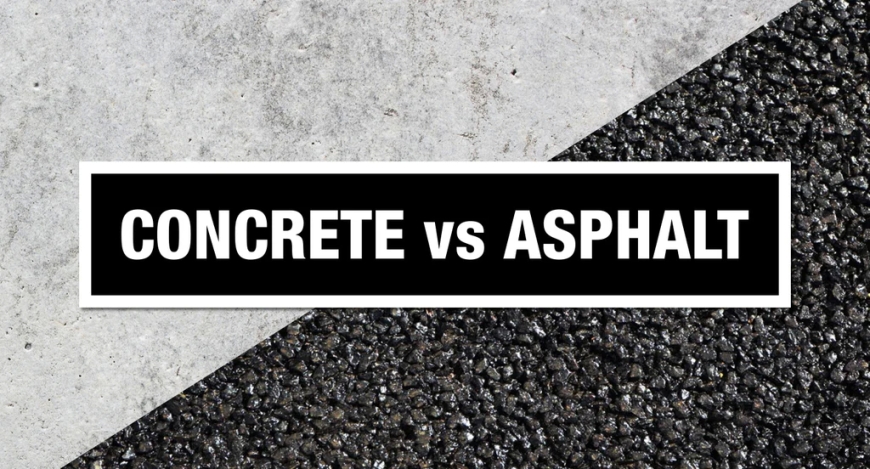Installing Asphalt and Concrete: Which is the best option for a driveway?
Asphalt installation and concrete application are the two most often used driveway options. How would you choose between them?

Asphalt installation and concrete application are the two most often used driveway options. How would you choose between them? Both have benefits in terms of cost, durability, maintenance requirements, and curb appeal. Choosing between the two is not that easy, as both could be functional for many years.
This blog details the main differences between asphalt installation and concrete driveways, breaking down factors that matter most, such as climate, upfront costs, and how each type of material affects your home's future resale value. Whether you are constructing a new home or just looking for a driveway renovation, this guide will help you make a well-informed decision tailored to your needs.
1. Cost: Upfront Investment vs. Long-Term Value
As a general rule, asphalt bests the comparison regarding initial cost. It's often less expensive upfront, sometimes even for a few dollars per square foot less than concrete. But that's not the end of the story in terms of installation costs. Asphalt often needs maintenance from time to time; seal coating every 2-3 years adds up to the lifetime cost.
On the other hand, concrete is pretty pricey in the beginning, but it outlasts asphalt significantly with lower maintenance costs. When cracks do appear, concrete driveways typically hold together for a much longer time without major intervention, and the cost differences even out for some homeowners over time.
Verdict: If budget is the issue, asphalt would be the default preference since it's cheaper. But if you can afford to spend more to have it last much longer, concrete could be your better choice.
2. Durability: How Well Does Each Hold Up?
Both have excellent durability but work very differently under different conditions. Asphalt installation is much more flexible. It has thus more resistance to cracking in freeze-thaw cycles. It expands and contracts without breaking as much as concrete might. This can make it a good choice for regions that experience very severe winters.
Concrete, though feasible during warmer seasons, is more prone to cracking if it undergoes freeze-thaw cycles when not appropriately treated. On the other hand, it also resists hot temperatures and doesn't melt like asphalt tends to during the day.
Verdict: Asphalt can better endure freeze-thaw cycles in climates. In warmer climatic areas, concrete can last longer than asphalt.
3. Maintenance: What's Needed to Keep Them Together?
Asphalt driveways need maintenance. One method of safeguarding them against the effects of sunlight, oils, and oxidation is to apply a coat of seal every few years. Additionally, cracks must be patched immediately, which prevents water from settling and further worsening the cracks.
Concrete requires less maintenance, but it is not maintenance-free. If cracks appear, they may be relatively hard to fill in smoothly compared to asphalt. Oil or rust stains may also linger on concrete much more easily, as they do stain and prove hard to clean.
Verdict: Asphalt installation requires more frequent yet less labor-intensive maintenance. Concrete requires less maintenance but requires the help of professionals for major repairs.
4. Esthetics: Which one Looks Better?
Concrete also offers aesthetic options in a variety of ranges. It can be stamped, colored, or stained to create any look desired, even to mimic the appearance of more expensive materials such as brick or stone. It presents a sleek, modern look and is often viewed as more customizable for homeowners who want that curb appeal.
Asphalt, on the other hand, is only available in basic black. It takes up a lot of space but has a clean and flush appearance. However, concrete is a better option for designs.
Verdict: Concrete wins if you want aesthetics and ease in design. If you prefer simplicity and cleanness, asphalt is fine.
5. Weather Considerations: How Do They Perform Under Extreme Conditions?
Asphalt installation is great for colder climatic conditions. These materials can flex and contract as the temperature changes, thus posing less danger of cracking. However, they get soft and break easily with extremely hot temperatures.
Concrete is less heat-resistant but more unforgiving of cold weather. When not installed and maintained properly, it cracks in freezing temperatures.
Verdict: Asphalt is ideal for cold, freezing conditions, whereas Concrete is great for areas with extreme heat.
6. Resale Value: Does it Have an Impact on Your Property Value?
Asphalt and concrete driveways add value to a home, but concrete is often the slight edge in curb appeal and resale value. An excellently maintained concrete driveway is a premium feature for upscale homes. In contrast, an excellent asphalt driveway can add a boost to the appearance of your home but isn't weighed the same in the eyes of potential buyers as concrete.
Verdict: On resale value after decades, concrete is oftentimes superior to asphalt especially if aesthetics are highly valued in your neighborhood.
7. Installation Time: How Long Does It Take?
Asphalt installation can sometimes happen much faster than that of concrete. Your driveway can be ready to use in a day or two for asphalt, while concrete takes longer to install and cure before it becomes ready for use, sometimes up to a week.
Verdict: If you need things done fast, then asphalt is the winner in this regard. Concrete will take more time to set but could be worth the wait depending on what you are looking to accomplish in the long term.
8. Environmental Impact: Which is More Sustainable?
Both materials fall into environmental issues. Asphalt is a petroleum-based substance but is 100% recyclable. The old asphalt can be broken and reused in newer paving projects, thus working as an eco-friendly option in the long term.
Concrete has a higher carbon footprint because it takes a lot of high energy-intensive input to produce cement, although newer, eco-friendly options have improved its sustainability, like permeable concrete or using recycled products in its construction.
Verdict: Asphalt is often regarded as the more ecological-friendly choice, however concrete technology has been advancing constantly and the work that has been done on these technologies made it more eco-friendly too.
Conclusion: Which one is right for you?
Generally, whether asphalt installation or concrete, the choice is purely a question of personal preference, budget, and climate. In those regions with extremely cold climates and next to no disposable income, asphalt tends to be the better choice because it is more pliable and installed much faster. On the other hand, in warmer climates or for those seeking to add some extra value to the house price, concrete may prove the better investment, considering its longevity, customization options, and curb appeal.
Whether you prefer asphalt installation or concrete, professional and regular maintenance will keep it in top shape for years to come.
What's Your Reaction?























